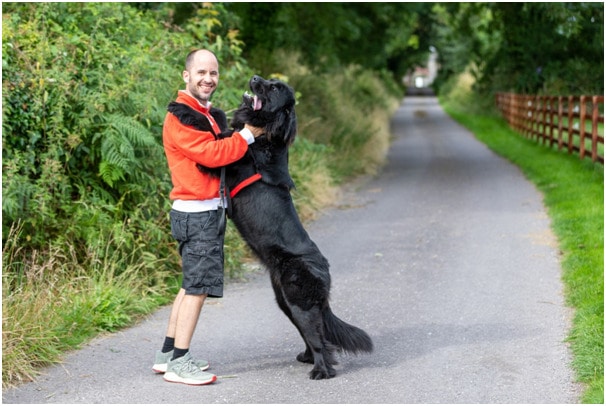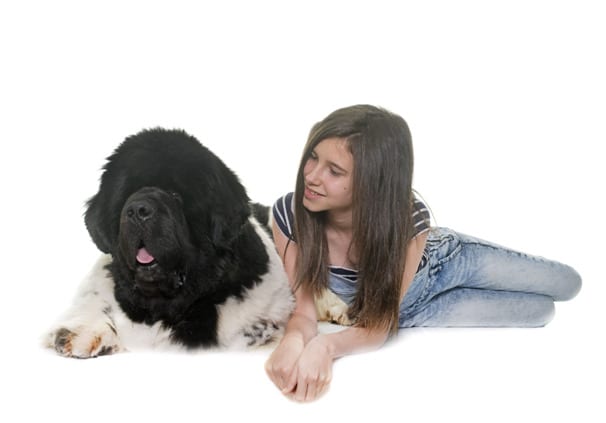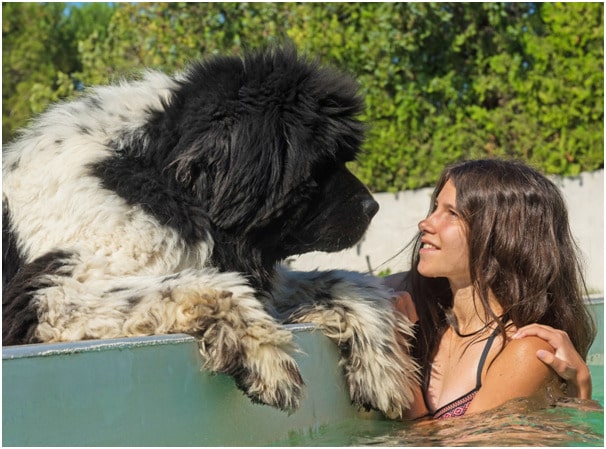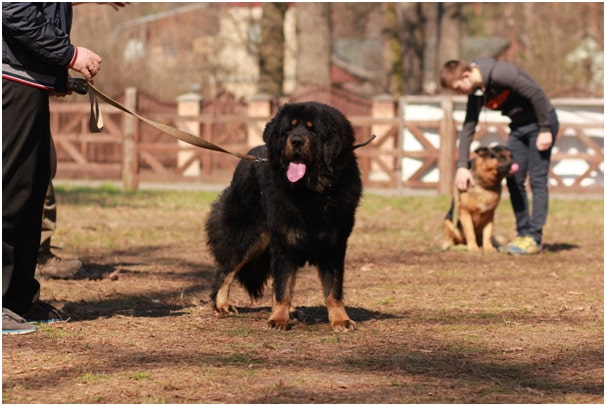Finding that trust in your Newfoundland can take time, but building a special bond with them can build a great relationship. Your bond with them will develop throughout your lives as you train, play, exercise, and live together. This can result in a happy and healthy life for both of you.
How to Get Your Newfie To Trust You?
Like many dog breeds, Newfies will carry out different gestures to show their trust in you. Some gestures include eye contact, body language, checking in on you during walks, or a jolt of excitement when they see you. These actions are essential when getting your Newfie to trust you.
Here are 11 valuable tips on how to get your Newfoundland to trust you, and develop the best relationship possible.
Provide Your Newfie With Time To Adjust
If you are a pet owner, you may know what it’s like when bringing your new pet home. When they are in an unfamiliar environment, they begin to tense up and show fear. The same goes for Newfoundlands.
It generally takes about three weeks for a dog to adjust to its surroundings. Here’s how you can succeed in finding their trust during the first couple of days.
During the first few days, give your Newfie some time to decompress. Let them explore their surroundings such as the house, yard, and other places to get a feel for their new environment.
Moreover, give them the chance to get to know you and the family.
Despite their large size, Newfoundlands are very friendly and can adjust to their environment quickly.
However, they still need time to get used to new smells, sounds, and other sights. This can be one of the most stressful times, so it is best to keep calm and stay positive.
Provide Your Newfie With Their Own Space
Providing a safe atmosphere is essential for your Newfie. Along with giving them time to adjust, they may do it best when they have their own space. Here is how your Newfoundland can find comfort in their new home.
You can make your Newfie more comfortable by giving him his own bedding and having a safe spot for them. This may include having their own room or somewhere they can go when they feel stressed or tired.
Your Newfie may need a little extra time to relax from the stress of being in their new environment.
Comfort Your Newfie When They Become Afraid

There is no doubt that dogs can show sudden fears when it comes to trusting their new owner. They may have sudden reactions such as sitting in a corner, hiding under furniture, or specific triggers resulting in anxiety. Here are some ways to comfort your Newfie when they are afraid.
When your Newfie is feeling anxious, you may want to figure out the causes of such distress. These signals may include:
● Showing fear from their body language (i.e., their head being down, or ears are laid back.)
● Constant yawning
● Trembling
● Hiding in a dark space
Once you see how your Newfie looks when they are afraid, you can determine what triggers their anxiety. These triggers may include:
● Past traumas (i.e., your Newfie could’ve been a victim of abuse)
● Animals
● Loud noises
● Scents and sounds they are unfamiliar with
Depending on the situation, you can use these comforting techniques to ensure your Newfie is safe and out of harm’s way.
● Find a distraction: If your Newfie is feeling nervous, you can find a way to distract their stressor with something they enjoy doing.
● Exercise: You can help relieve your dog’s anxiety by taking them for a walk.
● Physical contact: You can always pet your Newfie or sit beside them to calm and relax them.
● Give them a timeout: Your Newfoundland may need some quiet time to relax in their room or safe spot.
Discover What Your Newfoundland Loves

We all know that dogs enjoy running, swimming, playing fetch, but with every dog comes different personalities. Often, Newfoundlands are very friendly to the people they love, but they have specific behaviors that you may not know yet. Here is how you can discover what they enjoy doing.
Newfies are very heavy-set dogs, but they like to sit beside you or lean on you. This behavior is known as a sign of their protection for you. Although Newfies aren’t considered aggressive, these canine instincts suggest they will provide you a sense of security, a barrier to unwelcome intruders, and a sense of comfort.
In addition, Newfies are great swimmers and love the water. The fur coat is very thick; they have strong muscles for swimming and can hold their breath for extended periods.
Newfoundlands are considered working dogs, so being productive is something they enjoy doing. They enjoy accomplishing a task for you; otherwise, they will become restless or bored quickly.
Listen To What Your Dog Is Saying

As a dog owner, you want to understand what your Newfie is trying to tell you. These signs can signify sickness, happiness, and other emotions. Here are some signs you should look out for.
● Panting is a standard behavior in dogs. Your Newfie may pant if they are feeling happy or if they are feeling nervous about something. (Heavy panting can indicate a sudden illness or trauma.
● Whining can either be your Newfie asking you for something or expressing emotions of sadness.
● Barking is a way for your Newfie to express himself. The pitch of their bark can signify different behavior. If your Newfie is barking rapidly or deeply, they could be alerting you about a stranger. If they are yelping, it could mean they are in pain.
Allow Your Newfoundland To Rest In Your Room
Some dog owners won’t allow their pets to sleep in the same room, while others enjoy snuggling beside their furry friends. Newfies are very calm, but here’s why you can allow them to rest with you.
As previously mentioned, Newfies are a large dog breed, and they tend to shed enormous amounts of hair. Rest assured, sleeping with their pet owner can provide some sense of security and safety for them.
Utilize Positive Training Techniques With Your Newfie
Training is an essential part of a dog’s routine. It is essential that you reward your Newfie when he does good deeds. Here is why and when you should reward certain behaviors.
Obedience training is essential for the dog to understand dominance. You can use words such as “sit,” “come,” “roll over,” and other basic commands in their routine. When using positive reinforcement techniques, you want to reward your dog for a desired behavior.
You can shape your Newfie’s behavior by teaching them cues. In other cases, shaping your dog’s behavior can help them gradually perform a desired action. Once they perform a good behavior, you can give them a pat on the head, a treat, or praise.
Have Fun With Your Newfie
There are many fun things you can do to spend time with your Newfie. Moreover, they enjoy outdoor activities. Playtime with your pet can help them cope with behavioral issues and help you build a strong bond with them.
Here are some ways you can have fun with your Newfoundland.
Playing fetch is a great way to give your Newfoundland the exercise he needs while also building trust.
They enjoy playing with fetch toys, and because they are a “people’s” dog, they will enjoy interacting with you. Swimming is also an essential part of making your Newfie happy. They will find enjoyment in the water, so it is best to give them a swim every so often.
Newfies also enjoy agility exercises and offer mental stimulation. When teaching agility, you don’t need an entire agility course. Some examples are dog walks, running through tunnels, or standard jumps.
Be Present With Your Newfie
Pets are a significant part of our lives, so it is important to be present with them as much as we can. Here are some ways you can be present with your Newfoundland that also builds trust.
The first factor is to be active with them. When taking a dog walk, your Newfie may want to show you their sights and surroundings.
The second factor is playtime. Your pet may have a pastime they enjoy doing, such as exploring your backyard or playing a game of tug-of-war. The key here is to keep it fun!
Feeding Your Newfie
A Newfie’s diet requires at least 4-5 cups of dry food split into two meals. Here are the different types of diets that are included during mealtime.
● Kibble diets – a dog food that is processed and cooked
● Raw diet – this consists of freeze-dried or pre-packaged raw meat, raw eggs, ground or whole bones, and vegetables
● Home-cooked diet – a home-cooked meal that consists of vegetables and animal proteins
Have Adventures and Playtime With Your Newfies

Taking your dog on an adventure can be an excellent way to build trust with your Newfoundland and bond together. Here are some examples of experiences you can do with your Newfie.
● Hiking is an excellent way for you and your Newfoundland to bond. They enjoy walking alongside you during a hike and exploring different surroundings.
● If you enjoy fishing, your Newfie can offer their support and can go for a nice swim in the meantime.
● You can check your local area for dog parks. You will have the opportunity to take your Newfie on a nice walk, and it gives them the chance to look at their surroundings.
A Newfoundland is a people dog that enjoys being close to family and loved ones. It may take some time to build trust with your Newfoundland, but the result will be worth the effort for all concerned.


